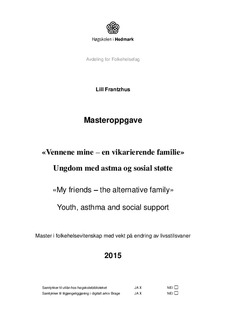| dc.contributor.author | Frantzhus, Lill | |
| dc.date.accessioned | 2015-12-07T12:15:22Z | |
| dc.date.available | 2015-12-07T12:15:22Z | |
| dc.date.issued | 2015 | |
| dc.identifier.uri | http://hdl.handle.net/11250/2367183 | |
| dc.description.abstract | Norsk sammendrag: Bakgrunn:
Sykdommen astma rammer stadig fler og fler barn og unge, og
forskning viser til at
dette trolig er grunnet en kombinasjon av ulike miljøfaktorer, arv og fysiologi. Statistikk fra 2009
viser at mellom 5
–
10 % av alle norske barn og unge har astma. Forskning viser også til at fysisk
aktivitet og sosiale relasjoner e
r to ikke
-
medisinske faktorer som ser ut til å være svært gunstig for å
leve godt med en kronisk sykdom som astma.
Hensikt:
Se på teorien som ligger til grunne for å sette astma og opplevelse av mestring i
sammenheng med ungdommer i alderen 16
–
20 år.
Problemstilling:
Hvilken betydning har habiliteringsopphold for mestring hos ungdom med astma?
Metode og deltakere:
I denne oppgaven brukes en kvalitativ tilnærming gjennom
informantintervjuer. Det ble gjennomført 8 semi
-
strukturerte intervjuer som ble ta
tt opp med
diktafon. I etterkant ble disse hørt igjennom, for å så bli transkribert og analysert. Utvalget består av
6 jenter og 2 gutter.
Resultater:
Resultatene viser at sosial støtte, trygghet, kunnskap, rett medisinering og det å mestre
fysisk
aktivitet ble fremtredende som helsefremmende faktorer for ungdommene i undersøkelsen.
Diskusjon:
I intervjuene med informantene, kommer det frem at sosial støtte og trygghet oppgis
som de viktigste faktorene til mestring. Et annet aspekt som blir
diskutert er betydningen av trygge,
sosiale relasjoner. Dette er faktorer som vektlegges særdeles under slike habiliteringsopphold. Disse
faktorene settes i sammenheng med blant annet begrepene salutogen tilnærming, Sence of
coherence og anerkjennelse, og
diskuteres deretter.
Konklusjon:
En salutogen tilnærming gir grunn til å tro at ungdom som opplever mestring og
trivsel, vil kunne utvikle og bevare en god sence of coherence (SOC). En styrket SOC antas å styrke
ungdommenes forutsetninger for å håndtere
utfordringer som hverdagen byr på. Ungdommene er
samstemte om at kunnskapsnivået alltid kan bli bedre, slik at helsefremmende og tilretteleggende
tiltak kan gjennomføres for å skape trygghet.
Nøkkelord:
Astma, folkehelse, fysisk aktivitet, mestring, relas
joner, salutogenese, samhold, sosial
støtte, ungdom. | nb_NO |
| dc.description.abstract | English abstract: Background: The decease asthma strikes more and more children and youngsters, and modern
research shows that this might be due to a combination of several environmental factors, herita
ge
and physiology. Statistics from 2009 show that 5
-
10 % of all Norwegian children have asthma.
Research also shows that physical activity and social relations are two non
-
medical factors that
seem to be very favourable, when living with a chronic deceas
e like asthma.
Intention: Looking at the theories available, that can show the connection between asthma and good
mastering of the decease among children.
Problem: How important are treatment stays in sanatoriums for young people with asthma?
Method and
participants: This thesis presents information based on a qualitative approach through
eight interviews with informants. 6 Females and 2 males participated in this study.
Results: The interviews with the informants reveal that social support, mastering
and physical
activity are the most essential factors, but competence among adults is also highly regarded.
Another essential aspect is the importance of social relations and a safe and close net of friends and
family. The combination of these things is wha
t makes the best situation for the youngsters.
Physical activity is very important and health personnel should stress this even more.
Conclusion: Support from friends and family, physical activity and mastering the decease seem to
be the basal factors in
the teaching process for young asthmatic people. A salutogene approach
seems to develop a good sense of coherence (SOC). A strong SOC is important to handle a normal
day. The youngsters agree upon the fact that they can improve the level of knowledge, so h
ealth
training and health adaptions should be a part of the school days, extracurricular activities and spare
time.
Keywords: Asthma, coping, general health, physical activity, relations, salutogenesis, social
support, solidarity, youth. | |
| dc.language.iso | nob | nb_NO |
| dc.subject | folkehelse | nb_NO |
| dc.subject | astma | nb_NO |
| dc.subject | barn og unge | nb_NO |
| dc.subject | mestring | nb_NO |
| dc.subject | habilitering | nb_NO |
| dc.subject | salutogenese | nb_NO |
| dc.subject | venner | |
| dc.subject | sosial støtte | |
| dc.subject.mesh | Community Medicine | |
| dc.subject.mesh | Public Health | |
| dc.subject.mesh | Asthma | |
| dc.subject.mesh | Friends | |
| dc.subject.mesh | Adaptation, Psychological | |
| dc.subject.mesh | Child | |
| dc.subject.mesh | Adolescent | |
| dc.subject.mesh | Social Support | |
| dc.title | «Vennene mine – en vikarierende familie» : Ungdom med astma og sosial støtte | nb_NO |
| dc.title.alternative | «My friends «My friends – the alternative family» : Youth, asthma and social support | nb_NO |
| dc.type | Master thesis | nb_NO |
| dc.subject.nsi | VDP::Medical disciplines: 700::Health sciences: 800::Community medicine, Social medicine: 801 | nb_NO |
| dc.source.pagenumber | 66 | nb_NO |
